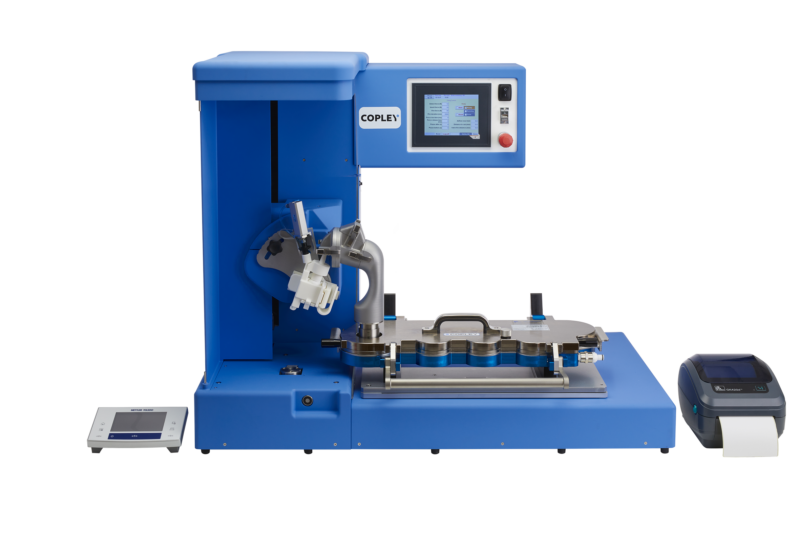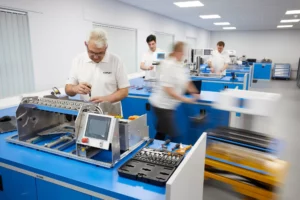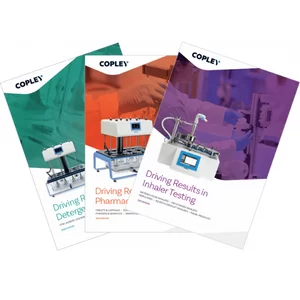11 March 2021, Nottingham, UK: Copley Scientific, the global leader in OINDP testing equipment, has introduced a series of new accessories that work with established products to deliver efficient, integrated solutions for measurement of the critical quality attributes of nasal sprays, aerosols, and powders. Currently the subject of intense research activity, particularly for generics manufacturers, nasal products deliver drugs for both local and systemic action. The new range of accessories allows customers to:
- Reproducibly measure the delivered dose uniformity (DDU) of nasal sprays, in line with regulatory requirements, using automated and manual methodologies.
- Easily establish robust, automated nasal drug product test set-ups to measure the aerodynamic particle size distribution (APSD) of the respirable fraction of the dose.
- Improve in vitro-in vivo correlations (IVIVCs) and study regional droplet deposition in the nasal cavity, to optimise drug delivery via a target pathway.
DDU measurement for nasal sprays calls for firing of the product into a vertically mounted sampling apparatus. The new Nasal Spray Dose Collector (NSDC) and Nasal Spray Waste Collector (NSWC) have been designed specifically for this purpose. While useful for manual DDU testing, they can be integrated with the Vertus II/Plus automated shake and fire system in a highly productive test set-up that maximises the reproducibility of DDU measurements while alleviating the health and safety risks associated with repeated manual nasal spray product operation.
The new Alberta Idealised Nasal Inlet (AINI) is an important step forward in terms of achieving more clinically representative nasal product testing and is particularly valuable for the demonstration of bioequivalence. Building on the reputation of the Alberta Idealised Throat, the AINI was originally developed by Professor Finlay from the University of Alberta and has an idealised clinically validated geometry created from Computer Tomography (CT) scans of individual subjects. It is made up of four individual regions – the vestibule, turbinate, olfactory and nasopharynx – and mimics deposition behaviour in each while simultaneously generating a sample that accurately reflects the respirable dose. Manufactured from aluminium, the AINI has a robust, leak-free, easy-to-use design. It can be used with a filter, such as the Fine Fraction Collector, to quantitatively determine drug deposition by chemical recovery and assay or interfaced with a cascade impactor to representatively measure the APSD of the respirable fraction.
Further accessories additionally enable interfacing of the Vertus II/Plus with any routinely used cascade impactor, via an expansion chamber or AINI, for representative measurement of the APSD of the sub-10 microns, respirable fraction of the dose. Such testing is essential to quantify the risk of drug delivery via the lung, rather than via the nasal cavity. As with DDU testing, use of the Vertus II/Plus with cascade impactors such as the Next Generation Impactor and Andersen Cascade Impactor for this application, reduces measurement variability, boosts productivity, and alleviates health and safety concerns.
Find out more about the new nasal product testing portfolio and how it can accelerate nasal product development: www.copleyscientific.com
CAPTION: The Alberta Idealised Nasal Inlet enables the generation of drug deposition data for four specific regions of the nasal passageways and interfaces with all pharmacopoeia-recommended cascade impactors
ENDS
About Copley Scientific
Copley Scientific is widely recognised as the world’s leading manufacturer and supplier of inhaler test equipment and is a major provider of testing systems for other pharmaceutical dosage forms. The company also supplies equipment for detergent testing.
Copley’s pharmaceutical product range includes test equipment for all types of orally inhaled and nasal drug products – metered-dose inhalers, dry powder inhalers, nebulisers and nasal sprays – with a particular focus on solutions for delivered dose uniformity and aerodynamic particle size distribution measurement. It also includes testers for tablets (dissolution, disintegration, friability and hardness) capsules, powders, suppositories, semisolids and transdermals.
Used from R&D through to QC, this extensive range of equipment is supported by a full validation and aftersales service. Copley Scientific has offices in the UK and Switzerland and works in partnership with aerosol particle science experts MSP Corporation in North America; specialist distributors extend localised support across the world. This network provides expert help and training to every customer, directly enhancing the application of all Copley products.








